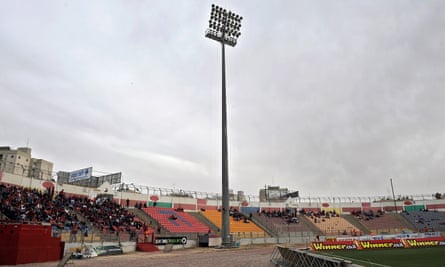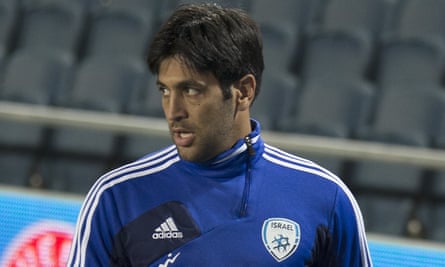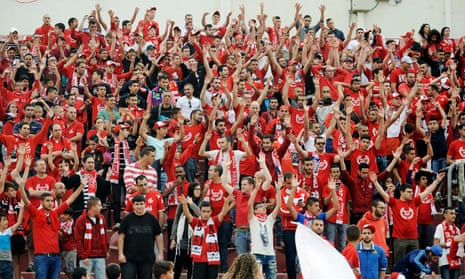The following is an extract from issue 22 of the Blizzard, which is on sale in September. The Blizzard is a quarterly football journal available from www.theblizzard.co.uk on a pay-what-you-like basis in print and digital formats.
On 28 December 2015 I watched the game between Hapoel Beer Sheva, my team, and Hapoel Raanana at the Turner Stadium in Beersheba, in the south of Israel. After 90 minutes I knew three things: this was my favourite place in Israel, that Hapoel Beer Sheva could win the title after 40 years and that my mother, Yael Adar, wouldn’t be alive by then. Talk about the best of times, the worst of times.
For me, Beersheba born and bred, although I’ve lived in the UK for the last 16 years, it was the fulfilment of a dream. Turner has replaced the old Wasermil Stadium after 50 years of suffering. Wasermil was a clutter of low cement stands, far away from the pitch and, near the halfway line where the best seats would usually be, two gaping holes. Four huge pylons stood in the middle of the stands, giving the look and feel of a refugee camp, and made Wasermil the worst stadium in Israel’s top league. Spread over a huge area, it took more time to walk around it than the Emirates Stadium (I should know – I had to run around it in high school), but with a capacity of only 14,000, was a block to the club’s growth.
Turner Stadium is located at the edge of town, looking north to the Negev Desert. It is a jewel box of a 16,000-seat stadium, inspired by Vitesse Arnhem’s GelreDome. It was inaugurated at the second home game of the season and after that became a bastion. “It is something special,” Doron, my twin brother, a season-ticket holder along with his son, told me. “For the first time since you left, you are missing something great here.”
He wasn’t exaggerating. Turner is a compact and intimate stadium with the feel of a tight arena, perfect sightlines and, for the first time in Israel, a proper kop at the south end. Full for every game with fans wearing red, it was a bit of a shock for me. The difference from the old to the new stadium, from the worst to the best, from a stadium that drove fans away to one that instantly became a home couldn’t have been greater. I was supposed to visit it for the first time on my usual winter trip to Israel, but rushed home earlier when my mother fell ill and had to undergo brain surgery.
When I visited her, recovering in the local hospital later, she knew that we had won. The medical staff in the operating theatre spoke about the game as they were making the final preparations. That’s how it works here. The mayor is an ex-player, his driver also used to play for the team and a previous mayor had a son playing for the club. Hapoel Beer Sheva is a club that has a city and an entire region behind it and after 40 years it has risen from the dust.

Hapoel Beer Sheva won successive championships in 1975 and 1976, won the cup in 1997 and since then they have been mismanaged, relegated twice, avoiding a third drop only on the last day of the season in 2012 and 2013. In 2014 and 2015 the club improved dramatically and gave Maccabi Tel Aviv, the champions for the previous three years, a run for their huge money before fizzling out in the latter stages of the season, finishing second and third. This season the challenge was more substantial. The squad was better and deeper, the new manager, Barak Bachar, a promising choice and the stadium a fortress.
The turning point was in the summer of 2007 when Alona Barkat became the first woman to own and run a football club in Israel. The club was then playing in the second tier and owned by a local businessman. Crumbling under debts and poor results, and with the fans increasingly bitter, Beer Sheva were facing disaster. Barkat, the wife of a wealthy high-tech entrepreneur, injected money, made almost every possible mistake at first but learned from each and every one of them. The organisation has improved year after year but results were poor until the summer of 2014 when Elyaniv Barda came home.
I met the forward in November 2008 for an interview. In one season, he had become the heart and soul of Racing Genk. He later led them to cup and championship success in Belgium but even then he told me that he was planning to come back to Beer Sheva for one final season. “It’s my club,” he said. Three seasons ago he returned and asked for a championship bonus clause in his contract. Barkat laughed but eventually agreed.
When Barda signed, other Israeli stars followed. The psychological barrier was smashed. Beersheba is only 100km from Tel Aviv but in the national psyche it is light years away. It is the major city of a neglected region with a poor image. It always reminded me of the joke about Texas from the movie True Stories when God take a rest just after creating the Negev and Beersheba. A day later he takes a look at the desert, the dust, the ugly town and the unbearable heat and in his wisdom sees it will be much easier to create people who would love this place instead of making it beautiful. Barkat turned out to be one of those people despite living in the smartest neighbourhood in Tel Aviv and putting money and endless energy into the club. With her money, Barda’s leadership and Turner’s appeal, Hapoel Beer Sheva could build a squad to rival Maccabi Tel Aviv at last, despite having a budget that was less than half that of the champions. All four foreign players turned out to be outstanding, a large squad help to overcome many injuries and Bachar grew quickly into his role. The problem was Eran Zahavi, Maccabi’s talisman. With a record-breaking 35 goals in 36 games, it took something special to win the league.

They started slowly and after five games the team had only seven points but Bachar, only 36, did what would become the trademark of the club and learned on the hoof. He understood that the key was a strong midfield, usually with three players led by the excellent Nigerian John Ogu, with rotation but also a clear hierarchy. Once he found that balance, Beer Sheva became the best team in Israel. They didn’t play free-scoring football but controlled and thoughtful football. Beer Sheva looked like a team that knew what it wanted to do. On 21 December they beat Maccabi in Tel Aviv to lead the table by three points. Three days earlier I had got the news about my mother. Although she was in her 80s, she was active, still drove and was a pillar of her community in the little village outside Beersheba. But a brain tumour meant she had only two months left to live.
In those two months I went back and forth from London to Beersheba, stayed with her and my two brothers and went to games. I don’t recall much more than that. In the time between the first alert and the end, Hapoel Beer Sheva opened a lead of five points. We went to a game in the last week of her life, a traumatic and frightening week, the longest of my life, and enjoyed another win, but we were afraid we were going to get a call during it. My twin brother, who took the burden of it with my older brother, had to go to Beersheba almost every other day. The biggest medical supply charity was on the road to Turner and every time he stopped there he would walk to the open gates and look at the stadium. Turner and Hapoel Beer Sheva were our morphine.

Standing there in the stadium celebrating another goal and win, hands over mouths and trying not to cry, it brought a sense of proportion to football. By that I mean that football is a proportion-free zone. I knew what was coming soon. The pain and loss were too profound for words but during the games, I was like any other fan, maybe just more emotional. Each victory was the whole world and actually more important than ever. Beersheba wasn’t a great place to live back then but we had our family home and team. My parents weren’t fans but they knew how much we cared about Hapoel (and it was also the best way to get me out of the house). For many years I came back only to see my parents, but from now on, it will be only to see my team. Every time I picked up a ticket to a home game from the office near the old town it was just opposite the home where I grew up. Next season “a home game” will have an added meaning.
To make things even more confusing there was the Leicester story in England. I lived there during my first year in the UK and had a season ticket to Filbert Street. Foolishly I didn’t become a fan but still I still have friends who get excited at every game and Leicester’s story meant to me more than to other non-fans. Relatively speaking, Beer Sheva are much bigger than Leicester City, but we were also an underdog, with a great team spirit and excellent scouting. I was at the King Power Stadium when the Foxes beat Liverpool with that Jamie Vardy goal and kept thinking, “It could happen to us” – until I got a text message from my brother telling me to get ready for the end after another drastic deterioration in my mother’s condition. On 25 February 2016 my mother passed away at home.
I lost my sense of taste. Every now and again something tasted powerful and wonderful, although the next day it would taste like water again. Normal life resumed fast but also seemed tasteless apart from our championship run. The team went on a phenomenal run of 17 wins and two draws in 19 games after the fifth game of the season. In a normal season it would have been enough to build a healthy gap but Maccabi Tel Aviv kept the gap at five points. The tension bred a folk campaign called Ama Yaamik. It is an expression in Iraqi that means “may you go blind” and is used to ward off the evil eye or bad luck. At its core was a primitive and annoying superstition that held that every positive word said about us was intended to hurt the run. For most of the fans it was a way to ease the tension so every victory was greeted with a rendition of, “Beer Sheba won’t get relegated.” The mascot, a camel, had the number 55 on his back and the players’ bus was number 555, as 5 and open palm are key ingredients of the Ama. I, an atheist, found myself unable to say, “If we win it…” without adding, “Ama Yaamik,” immediately. Well, it worked, so why change?
And then we got stuck. Injuries to two key players, Maor Melikson and Tony Nwakaeme, one game of too many tactical changes, another of mental block and four successive draws (one against Maccabi during the 10-game play-off between the top six teams) narrowed the gap to one point. In the 30th round of games, on 11 April, Maccabi hosted Beitar Jerusalem, their bogey team. On that day a beloved relative of mine passed away in London and I was in Bristol working on a piece for a travel magazine. It turned out to be the last issue of the magazine, my favourite publication. Maccabi beat Beitar with a 90th-minute goal by Zahavi. They went top by one point and had a superior goal difference. 2016 was turning out to be a horrible year.
To add to my misery, many of my cultural heroes have gone, one after another. The biggest loss was Johan Cruyff, my first football hero and father of Jordi, Maccabi’s sports director and the man behind their success. Little did I know this would have a huge impact on the title race in Israel. From then on, Jordi spent more time in Barcelona and Amsterdam, and things, as Zahavi put it later, became loose at Maccabi. They drew their next game and Beer Sheva went top again. It became clear after they won the cup semi-final against Bnei Sachnin, an Arab-Israeli side. The key talking point was Maccabi’s goal, which came from a pass from Tal Ben Haim (not the ex-Bolton player) after Sachnin had kicked the ball out for a player to receive treatment. Ben Haim didn’t give the ball back and Maccabi scored.
After the game, Maccabi lacked a voice of reason. Of an adult, of Jordi. Maccabi and Peter Bosz, their dislikeable manager, refused to apologise or to try to calm things down. It was very short-sighted as Maccabi’s next league game was in Sachnin. After 90 sulphurous minutes, the result was 0-0 to the joy of the local fans who chanted, “Beer Sheva, Beer Sheva!” In the mayhem after the game Predrag Rajkovic, Maccabi’s young Serbian keeper, pushed the Sachnin manager to the ground. Maccabi players draped themselves in Israeli flags and Zahavi commented that he didn’t know if he was in Israel or Palestine. It didn’t go down well with the Sachnin players and fans. Not at all.

Rajkovic was suspended for three games but, astonishingly, Maccabi went to a civil court in Tel Aviv that ordered another hearing to be held in June. Maccabi, the most privileged, best politically connected, richest and strongest club in Israel became loathed. While most of the media loved the little Beer Sheva narrative, Maccabi’s fans in the media lost their heads. “They are miserable, sad people living in the desert … You want to paint their homes for charity, not to dismantle them on the pitch,” wrote one. “Beer Sheva are panicking and the root of it is the stupidity that engulfs the club,” wrote another.
Two games before the end of the 36-game season the size of our lead was five points. It felt like we had won it. The biblical phrase of “40 years in the desert”, recalling the wandering of the Israelites before they reached the Promised Land, was used again and again. We only needed two more points. The penultimate game was away against Maccabi Haifa, the only team not to lose to Beer Sheva this season. They maintained their record. Haifa won with the last kick of the game, 2-1, and Beer Sheva lost for the first time in 29 games. The gap was down to two points. It meant we had to win the last game.
It was the second-longest week of my life. If we failed, having been so close, we would have been the laughing stock of the country, this team would be destroyed and I would never live it down. For the first time I felt like a defeat could damage me for life, that it could bring me down and drown me in my pain. To lose it at that stage would have meant that “they” were right, that there was something wrong with us, that we were losers. It would mean not being proud of the club after a huge step forward, and it would unleash the negative forces among the fans. “I felt the stress. I knew that it was a matter of life and death for some people,” said Bachar. “I knew that if we lost somebody would die, some people wouldn’t be able to take it.”
It was a sleepless week and I stayed in London, feeling I couldn’t handle another flight. I had a trip to Yorkshire that week but couldn’t drive as I was too tense and tired. “I don’t want to die in an accident just a day before we win it,” I said to my brother.
“You should be positive and think that if you get killed and then we lose you won’t have to suffer it,” he told me.
It was time to ditch the Ama and face destiny. The game was at home against Sachnin. Oh yeah. Karma is one feisty bitch. After a week of pressure from Maccabi and Sachnin’s promises that they wouldn’t make it easy, the game started in a frantic atmosphere. I was watching it during the FA Cup final at Wembley on my laptop. My brother, his whole family and 16,000 other fans watched it in a crimson red Turner. After six minutes and a brilliant move Sachnin scored. The fear, the horror. It couldn’t be happening.
Ten minutes later we scored. Sachnin had their alibi and from then on it was only a matter of time before we got our goals. Hapoel Beer Sheva won 3-1 and were crowned champions again after a 40-year wait. I would have been happy with a scrappy championship, any title after such a long time. To win it with good football, a respectable 83 points, as one of the best ever teams in Israel’s history, with such a story, with Barda as our captain and knocking Maccabi off their “fucking perch” after a winter of despair meant that I knew that I would never feel anything like it again. It was the most important moment of my football life. That’s why when a Wembley steward asked me why I was so happy, jumping and shouting such a long time after the game had ended. Had I won the lottery, he asked. I thought for a second and told myself, yes, it is a cliche, but fuck it, I earned it after 40 years and said: “Oh no. Much better than winning the lottery.”
It led to the most emotional celebration at the ground and through the week. 100,000 people came to the official party two days later. I was relieved and also happy for my nephew who started supporting the team when they were in the second division. I was not euphoric and I didn’t cry as I thought I would. It was much deeper. For the first time in months the clouds over me disappeared and I was whole again. It was the best of times, it was the worst of times. It was the season of darkness, it was the season of light.

The Blizzard is a 190-page quarterly publication that allows the best football writers in the world the opportunity to write about the football stories that matter to them, with no limits and no editorial bias. All back issues are available on a pay-what-you-like basis in both print and digital formats from www.theblizzard.co.uk, with digital issues available from just 1p.

Comments (…)
Sign in or create your Guardian account to join the discussion